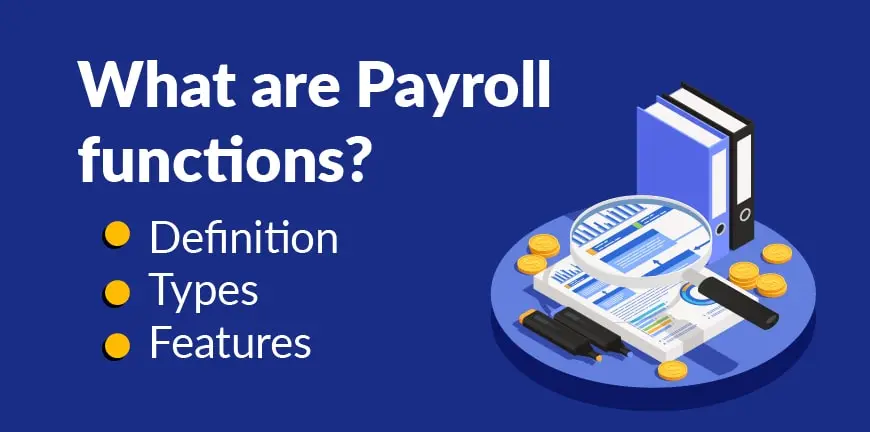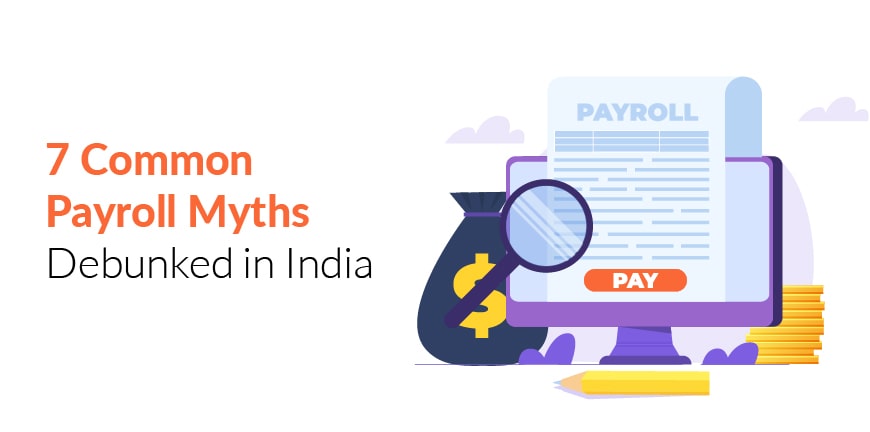
How Data Mining and Mini Satellites Could Be India’s Winning Bet in Outer Space?
05/11/2024
What is Workplace Diversity? Definition, Benefits, Challenges
08/11/2024You may have a small sized business, medium sized or a large business, regardless of its size, its essential to manage the payroll function of the organization effectively. A well-managed payroll system plays a crucial role in enhancing employee experience and encourages them to stay on with the company as well as perform better at their roles.
What is Payroll Function?
Payroll function refers to the process of paying salaries to employees on time and accurately for the work they do for a specific period of time on a set date. Some businesses take care of processing payroll on their own, while some prefer outsourcing payroll function to an expert third party service provider. The third-party companies usually perform a wide range of payroll functions, such as
- Tracking of working hours
- Pay calculation
- Processing payroll on time
- Processing salary and employee benefits
- Maintain payroll records
- Tax and compliance
- Audit and reporting
What are the Benefits of Outsourcing Payroll Function?
Outsourcing payroll has many advantages. Since its one of the most critical functions of an organization, it is essential to carry out the payroll function with care and execute it to perfection. And this is why you outsource it to an expert. Some of the various benefits that comes with outsourcing the payroll function to an expert are-
- Reductions and cost-effectiveness can be achieved.
- It allows employers to concentrate better on their business resulting in better productivity.
- Helps avoid penalties and errors on statutory remittances
- Engagement of a qualified team of experts to administer all aspects of your payroll and HR needs
- Generation of accurate MIS at your convenience
- Advanced software that preserves all sensitive data about your organization
- Easy access to the information system for all employees
- Update employee information as required
- Create custom reports
- Upload important documents related to benefit plans
- Gain total compensation reports
What are the Types of Payroll System?
There are various methods of payroll processing. Organizations can choose the type of payroll that suits their business needs.
The are 4 distinct types of payroll systems based on the way they are implemented-
1. In-house payroll
Like the name suggests the payroll is managed in-house, meaning one/group of employees within the company take care of processing the payroll. Be it staying updated with tax laws, or tax filing/withholding etc. every part of payroll is taken care of from within. In house payroll works best for small businesses.
Benefits of in-house payroll
- Avoids any major discrepancies.
- Cost cutting
- Lower security risks
- Intuitive tools that make the payroll process simpler
2. Cloud based Payroll (Software managed)
An online portal is provided through which you can manage your payroll utilising the automation tools. From data entry to tracking employee hours, everything can be managed in cloud. The tools and features are optimised for your payroll so you can keep track of every data about your employee. Tax filing, reporting and other payroll related services are also provided on cloud.
Benefits of cloud-based payroll:
- No external equipment or software needs to be purchased
- Automation features and excellent reporting options
- Integrates easily with the accounting software giving a complete solution
- User friendly interface
- Affordable and scalable solutions available
3. Professional managed by Bookkeepers or CPAs
This type of payroll is outsourced to an external bookkeeper or a certified public accountant. They are experts when it comes to payroll management, and this is mostly suitable for growing or larger companies. With a professionally managed payroll system, your payroll operations are covered without much of your intervention. It gives you time to focus on other critical business operations. But keep in mind only you are still liable if tax authorities produce any issues.
Benefits of Bookkeepers/CPA payroll:
- Best for medium sized businesses.
- Your payroll is handled by experts.
- A bespoke system that can be tailored to your needs.
- Affordable solutions made available.
4. Agency managed payroll service
You can hire an outside payroll service agency to take care of your payroll. With a payroll agency handling your payroll all obligations including payment of wages, deductions etc. will be completely handled by them on your behalf. This will ensure accuracy and can even avoid overdue payments.
Benefits of Managed payroll service:
- Best suited for larger organizations.
- All the core payroll tasks are covered.
- Accuracy and on-timely payments.
- Maintenance of 100% compliance.
What are the Payroll Function Features?
Payroll function in HR not only helps simplify complex tax calculations but can also help protect data, reduce loss of confidential information, minimize errors, and help keep employees in touch with the payroll policies, giving them insight of the company’s ongoing changes and stay updated with any changes thereon.
A good payroll software must boast a number of features that can help streamline the payroll process. Some of the mandatory requirements for payroll to function properly are-
1. Accuracy and Efficiency
Manual payroll process is prone to errors resulting inaccurate payments causing legal complications. An automated payroll system reduces the chances of human errors in calculations, data entry, and tax deductions.
2. Saves Time
Processing payroll manually can be time-consuming, especially for businesses with many employees. A payroll system can automatically calculate employee taxes and deductions and streamline the entire process. This frees up precious time for HR (Human Resources) and finance personnel to focus on other essential tasks.
3. Compliance and Tax Accuracy
As significant advantage of an automated Payroll system is that they can help organizations stay compliant with tax and labour regulation laws. State laws are constantly changing, making it difficult for businesses to keep track of them. A payroll management system can help calculate taxes, deductions, and contributions accurately, reducing the risk of compliance issues and penalties.
4. Enhanced Data Security
Employee payroll data includes Sensitive and confidential information such as social security numbers, bank account information and salary details. A reliable payroll system offers data encryption and secure storage, protecting sensitive employee information from unauthorized access and potential data breaches.
5. Employee Self-Service
Many payroll systems provide employees with self-service portals where they can view their pay stubs, tax forms, and other payroll-related information. This empowers employees to access and manage their data independently.
6. Provision of real time analytics
Payroll systems often come with reporting and analytics features that help businesses track employee time and attendance, generate reports on labour costs and productivity, and identify trends and patterns in payroll data. This data can be valuable for decision-making and financial planning as well as identify areas for improvement.
7. Integration with accounting software
A well-integrated payroll system can seamlessly synchronize with accounting software, making it easier to manage overall financial records and streamline the reconciliation process.
What are the Payroll Functions and Procedures?
Payroll can either be one of the functions under the many functions in HR or Finance or can operate as a separate department. Some of the different procedures that fall under the payroll functions are –
1. Salary Calculation and payments
One of the core functions of payroll processing is the calculation of salaries that includes gross pay and net pay. While calculating employee wages its important to take into account the different payroll components. Once the payroll calculations the team has to issue the payments to employees.
2. Distribution of Payslips
Along with accurate calculation of payroll, it’s also important to generate payslips and distribute them to employees. Providing employees with a payslip is a legal requirement in many countries. There usually are certain rules and regulations as to which information must be included in an employee’s payslip, which means the payroll department needs to be extra careful to include all the necessary information regarding pay elements, tax deductions, and more.
3. Payroll tax administration
Another key part of payroll is tax administration, including income tax, social security contributions and other statutory payroll deductions. It not only includes the calculation and deduction of said taxes from employee salaries and wages, but also their remittance to the respective authorities as well as the submission of the necessary declarations.
4. Payroll compliance
Compliance management is an essential part of payroll processes. The payroll team must ensure that businesses comply with federal and state and local laws and regulations regarding employee compensation. Further aspects of payroll compliance include statutory payroll reporting and compliance with data protection standards such as GDPR.
5. Payroll data processing
Processing and administering the huge amount of data the payroll function generates is an important part of the management process. Prior to calculating the salaries, the payroll team must consider and verify data input such as work hours, overtime etc. Once the payroll process is complete the data must be integrated into the accounting system.
6. Payroll record keeping
After the calculation, payment of salaries and distribution of payslips to employees its time to store the records. Record keeping in payroll means saving and storing all the pay-related documents, files and reports. Payroll records are subject to strict regulations that outline which files and information need to be kept for each employee.
Payroll function is a very important part of HR that ensures employees are compensated accurately and compliantly, which in turn supports workforce satisfaction and legal adherence. While in-house payroll management offers control, outsourcing this function has proven advantageous for many organizations.
Outsourcing payroll can reduce administrative burdens, enhance accuracy, and mitigate compliance risks through the expertise of specialized providers. Additionally, it allows HR and finance teams to focus on strategic initiatives, ultimately improving operational efficiency and contributing to the organization’s overall productivity and growth. For businesses aiming to streamline processes and optimize resources, outsourcing payroll is an effective, scalable solution that can adapt to changing business needs.
Frequently Asked Questions
1. What are different functions of payroll management?
There are various functions involved in the payroll management process
- Structuring of compensation to be paid and the processing of paychecks
- Management of payroll taxes and returns filing
- Salary slips and reports
- Salary slip compliance
- Integration of payroll
2. What are the stages of processing payroll?
There are three main stages of payroll processing-
- Pre-payroll activities such a defining payroll policy like pay, leave and benefits.
- Main payroll- where the data is put into the system and the net pay is calculated after withholding taxes
- Post payroll activities where the employees are paid through direct deposit or checks
3. What are the future trends of payroll?
Some of the emerging trends of payroll include-
- AI and Automation
- Payroll flexibility
- Enhanced cybersecurity
- Real time insights and analysis
- Future proofing of payroll
Contact Us For Business Enquiry

Yugandhara V. M
Yugandhara V. M serves as the Assistant Vice President – HRO at Alp Consulting Ltd., bringing over 14 years of rich experience in Human Resource Outsourcing, payroll management, and statutory compliance. He specializes in driving process excellence across HR operations, ensuring seamless service delivery and compliance with labor laws. Yugandhara’s expertise lies in managing large-scale client engagements, optimizing HR processes, and implementing efficient workforce management systems that enhance organizational performance. He also leads comprehensive payroll services, ensuring accuracy, timeliness, and compliance for diverse client portfolios.




